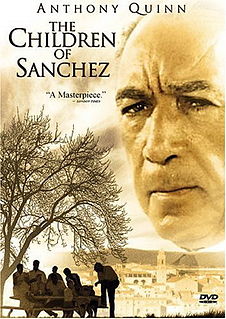- The Children of Sanchez
-
The Children of Sanchez Author(s) Oscar Lewis Country United States Publication date 1961 ISBN 970-05-0247-3 OCLC Number 31932807 The Children of Sanchez is a 1961 book by American anthropologist Oscar Lewis about a Mexican family living in the Mexico City slum of Tepito, which he studied as part of his program to develop his concept of culture of poverty. Due to criticisms expressed by members of the family regarding the Partido Revolucionario Institucional (PRI) government and Mexican presidents such as Adolfo Ruiz Cortines and Adolfo López Mateos, and its being written by a foreigner, the book was banned in Mexico for a few years before pressure from literary figures resulted in its publication.
Jesus Sanchez, age fifty, is the father, and his four children are Manuel, age thirty-two; Roberto, twenty-nine; Consuelo, twenty-seven; and Marta, twenty-five.
Film
The film based on the book and with the same title was directed by Hall Bartlett and was released in 1979. It stars Anthony Quinn as Jesús Sánchez, a widowed farmer trying to care for his family in Mexico City. An abusive womanizer, he is a hard worker and feels that by supporting his family financially, he is fulfilling his responsibilities to them. His conflict with his daughter Consuelo (Lupita Ferrer) continues through the entire movie as she attempts to break out of the role of being a submissive daughter. For advice and love, Consuelo goes to her grandmother (Dolores del Río), the family's matriarch that even Consuelo's father respects. The advice she gives Consuelo is to get married, as the only way to escape her abusive father.
Among those in attendance at the film's American premiere on November 17, 1978 were President Jimmy Carter and Rosalyn Carter, who were greeted at the premiere by Quinn, Ferrer and director Bartlett. Quinn himself escorted the President and the First Lady to their seats, and all proceeds went to the Mexican Legal Defense and Educational Fund. [1]
The musical score for the film was written by Chuck Mangione and won a Grammy award. The film's title song was also written by Mangione and earned him a Grammy for Best Pop Instrumental Performance.
Bette Davis appeared in an uncredited role in the film.
References
External links
Categories:- 1979 films
- Films based on non-fiction books
- 1961 books
- 1970s drama film stubs
Wikimedia Foundation. 2010.

